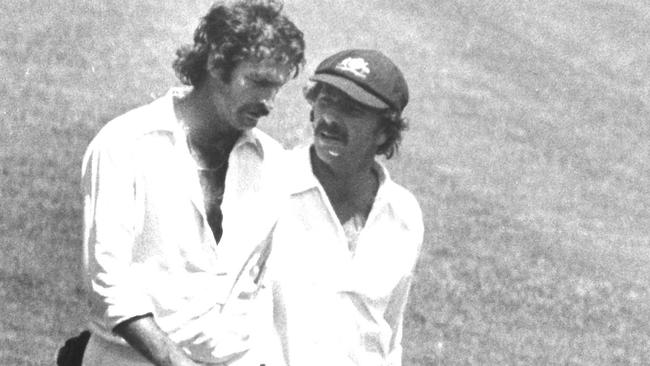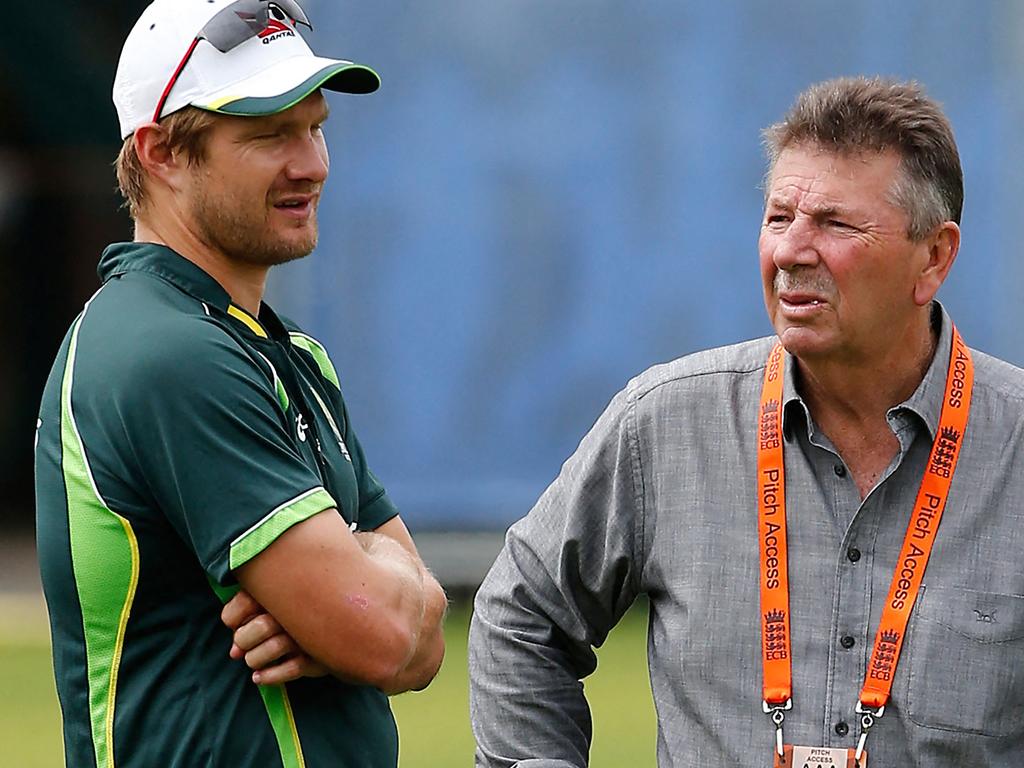Rod Marsh the glue that bonded Australia
The noise, the chatter and the laughter that is the soundtrack of every successful and harmonious side, came unfailingly from Rod Marsh’s corner of the dressing room.

There is a wonderful photograph of Rod Marsh accompanying Dennis Lillee on a walk to fine leg at the MCG in 1975.
Lillee is staring ahead, sweat-soaked and seething, at odds with his captain Greg Chappell about field placements. Marsh, shaggy hair protruding from beneath his baggy cap, is walking in step with and looking upwards at his mate, solicitous and attentive; you can see his gloved hand patting Lillee’s backside.
I once asked Rod to talk me through what was happening. Was he agreeing with Lillee or Chappell? “I disagreed with Dennis on a few things, but I never let him know,” Rod chuckled confidentially. “And I could get him to change his mind without him being aware of it.” Rod paused. “The best I could.” Then he laughed again: “He could have been double-bluffing me.”
I loved the respect, affection and shrewdness of that answer. Rod knew cricket, of course, but he also knew people, and that combination made him perhaps the definitive Australian cricketer of the 1970s and 1980s.
Others led; others starred; but, day-in, day-out, Rod personified the game in this country as perhaps no other player: aggressive, rugged and bristlingly competitive, but also democratic and companionable.
The people’s star. The man of partnerships, of which caught Marsh bowled Lillee was the greatest of all, a cricket catechism.
Those stocky legs; those hairy forearms; the definitive moustache; the growl of his appeal, usually one arm raised. Plus, of course, his job. Nobody in his era felt cricket more than Rod, through his hands, and into his heart. In some ways, I suspect that Rod subtly invented that idea of the wicketkeeper being a team’s unifier, rather than merely functional or auxiliary.
I remember Alan Crompton, an administrator who managed many an Australian team on tour, saying that Rod was the centre of every XI he formed part of.
The noise, the chatter and the laughter that is the soundtrack of every successful and harmonious side, came unfailingly from Rod’s corner of the dressing room.
Ian Chappell tells another story. At the time there was a superb but ageing writer, Ray Robinson – one the players read avidly and trusted to sit in their dressing room at close of play. But Robbie suffered gravely from ulcers, and could not stomach frothy beer. So, at tea every day, Rod would take the top off a long neck so that it was flat by stumps for Robbie to partake of.
Lest we forget, though, Rod was a genuinely great cricketer – greater than was recognised at the time maybe. Keepers’ statistics are difficult to interpret. Their chief attributes are reliability and unobtrusiveness.
Rod’s metier was keeping to fast bowling, throwing himself for catches, diving after wides, leaping for bouncers. For such a seemingly earthbound figure, he was remarkably agile, sometimes seemingly weightless.
There would be more photographs of Rod airborne than almost any other keeper in history. There are also those catches you simply remember. Here’s mine: second International Cup final, 28 January 1979, VFL Park.
Lawrence Rowe top edged Greg Chappell towards fine leg, where it looked like falling short of Lillee, sprinting off the boundary. Rod ran 30m, twisting and turning, but never losing sight of the ball over his shoulder, like a butterfly collector chasing a precious specimen, finally diving to complete the catch. I saw it once. I have never seen a replay, but don’t need to – I remember it clear as day.
But if he sometimes looked like clothes had been pitchforked onto him, Rod was also a deceptively tidy keeper. He would lightly push his gloves on before descending into his crouch; he would take the ball neatly on the inside of his body; the nickname ‘Iron Gloves’ was bestowed on him after some faulty early performances, but gradually became a sort of endearment, signifying resilience and dependability.
As a coach at the AIS Cricket Academy, too, Rod was almost, if not quite, a martinet. He had high standards. He was tough, and caring; he was harsh, and forgiving. He welcomed Ricky Ponting and Glenn McGrath; he welcomed Shane Warne back; he enlisted his own generation in the making of the new.
In 1993, I went to interview Rod at the academy. We walked around, bumping into its people: young cricketers, assistant coaches, ground staff. He had that fascinating capacity for seeming to find the right chord with everyone, alternately gruff, direct, mellow, humorous. It was as though he had brought his understanding of dressing room dynamics to life.
We stopped to watch Dennis coaching the young fast bowlers. You felt that effortless continuity between past and present.
When the academy wound up, Rod was recruited by England’s counterpart, and proved instrumental in the rise of cricketers as diverse as roommates Andrew Strauss and Graeme Swann. Rod told Strauss he didn’t think he’d make it; it motivated Strauss to prove he could.
Swann tells a story of his introduction, which involved the cheeky young Englishman calling Rod ‘an ignorant c***’ to his face in a jest he suddenly repented. “You know when you’ve totally misread a situation,” Swann recalled. For the next three years Swann chafed against the discipline, but gradually honed his abilities and ambitions.
Rod finally called Swann to his office, and asked the spinner what he wanted from the game. Swann said he wanted to play for England. Rod said he could: “I’ve spent the summer watching county cricket and you are the best spinner. Full stop.” Then: “I’m not a man to hold a grudge. Even against someone who calls me an ignorant c***…”
Swann cringed. A belated and craven apology spilled out. Rod offered a laughing handshake: “Go and take some wickets!” For England, Swann would take 410.
They’re starting to go now. David Hookes, of course, tragically predeceased them all. But last October’s passing of Ashley Mallett heralded the twilight of the generation who excited and awed those of us now in middle age, and who in some ways stayed our heroes and benchmarks. In their feats and their attitudes, though, you can still see all of cricket, what’s changed and what remains the same.






To join the conversation, please log in. Don't have an account? Register
Join the conversation, you are commenting as Logout